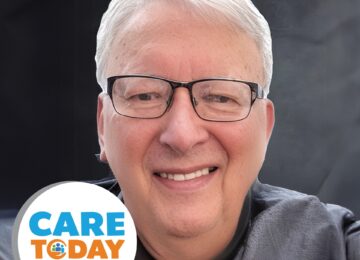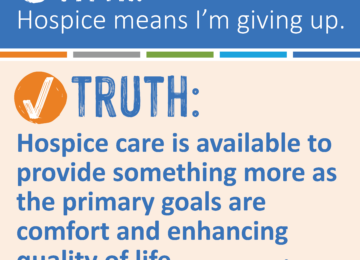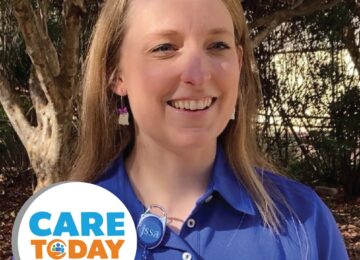Through the Eyes of A JSSA Hospice Chaplain

Author:
Anne Kline, MA, BCC, Former JSSA Hospice Chaplain
It takes love and patience to preserve the dignity and wholeness of someone who is dying. There is a sense of human spirit that even disease and dementia can’t take away, and it’s there until the moment we take our last breath. This is true even when a person can’t verbally communicate what they experience.
Some people see hospice as giving up. From my perspective, it’s just the opposite. For the person facing death it is a courageous decision to face the terminal nature of their condition and make the most of the life they have left. For family members, it is a loving decision to ensure a person’s comfort and quality of life, and also a practical recognition of the need for support to face the uncertainties and changes inherent in dying. Deciding to enter into hospice care can help a person maintain the utmost quality of life until their last day.
Hospice provides a team of skilled people who support a person and the family as they meet the challenges of facing death. Hospice chaplains help to affirm life and assist the person and the family in claiming the value of the time that is left.
My patients and families turn to me for guidance but the truth is that they are my teachers. My patients teach me about who they are, what life means to them and what it means to die. Every visit reaffirms for me how significant each one of us is. I have learned that there is no such thing as an ordinary person or an inconsequential life.
I am there to bear witness to people’s life stories. We talk about what is most meaningful to them; usually it’s the relationships in their life, the places they’ve seen, the pride they feel in their families and their life accomplishments.
I hope to be an encouraging and faithful presence accompanying people throughout their emotional journey. I lend a compassionate ear as they tell me about their loss of independence, their isolation and boredom, their fear of suffering and of being a burden to their loved ones. I sit with them, pray with them if that is meaningful, and respect their experience and their truth.
Every day, I’m touched by the power of love; spouses who honor their vows and children who embrace their roles as caregivers. Caregiving can be an emotional and physically exhausting experience. Caregivers are often grappling with all-consuming feelings of anxiety, stress and sometimes guilt. There also can be joy and deep satisfaction in being there, moment by moment, with and for their loved one. Embracing caregiving can bring emotional growth and healing.
I’ve seen people who are in very difficult relationships. Some of them have been estranged from their family for some time or have experienced some kind of abusive relationship. Yet, they have found ways to put that aside and say, ‘This is still my parent.’ They find a way towards forgiveness. Some even reclaim the compassion and love they had been missing or had longed for.
One of the most meaningful experiences for me as a chaplain is when, after one of my patients passes away, I’m asked to officiate at the funeral or memorial service. I know how comforting it can be to have someone who knew the deceased person perform this sacred task. I’m honored to give voice to their life story and to have been privileged to be part of their spiritual journey. I am grateful for every life that touches mine and teaches me about what it means to be alive.



